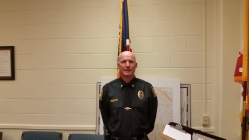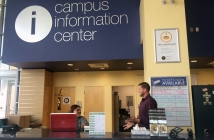Whether you’ve seen them patrolling the UMBC community, had a conversation with one of their officers or found one of their tickets on your illegally-parked car, you are probably at least aware of the UMBC Police Department. As students and faculty, it can be very easy to overlook everything that goes into the every day life of a serviceman. Thinking back about the news from the last few years, it can be even easier to assume that policemen are out to get you, that they are a force to be reckoned with and not so much a force that you should look to for protection.
Regardless of how one feels about the UMBC Police, it is paramount to understand the importance of their job, and that there are so many interesting and fantastic individuals that serve in our police agency. Deputy Chief of Police Paul Dillon is one of those people. Dillon is head of the Operation and Support Services Bureaus. In other words, he manages daily operations and the 24/7 police patrols on campus, as well as the emergency dispatchers, student marshals and record functions. As head of these bureaus, he oversees daily operations, reviews various reports, manages investigations and much more.
What makes servicemen like Dillon so vital to UMBC, alongside of what they do within the agency, is that they are so active inside on campus. “A lot of my role within the community is dealing with our Emergency Preparedness Program and running various training programs, as well as sitting in on different campus committees,” said Dillon.
“I’m a member of our Behavioral Response team, which looks at concerning behaviors of students, faculty, staff and visitors and decides on how they can be helped or managed,” said Dillon. “I’m an adviser in the Relationship Violence Advocate Program as well, which is typically involved with a lot of Title IX investigations, sexual assaults and so forth. Most of my day consists of running around campus, which I am completely fine with because I love being in our community and being an active member.”
Dillon has been in the force since 1987, where he started out as an officer for UMD. He transferred to UMBC in September of 2010 and has developed an insightful grasp of the UMBC campus. “One of the greatest challenges we face at UMBC is dealing with relationship violence and similar domestic issues. They’ve seemed to be creeping up more and more as time goes by,” said Dillon. “We also deal with mental health issues frequently. We transport students every semester to the hospital who want to hurt themselves in some way. There has been a steady increase of that as well.”
“My estimation is that certain students become overwhelmed by the college environment. They lose most, if not all of the support groups they had in high school, such as their families and friends and that in itself really takes a toll on mental health,” Dillon said. “The fact that they are pushed into this diverse environment so quickly makes it even worse. That is why we work so closely with the counseling centers on campus, as well as suicide-prevention programs.”
“Mental health issues are medical issues in the same way that cancer and alcoholism are medical issues,” said Dillon. “We do not want to lose any students. We want to see them to grow and succeed and we certainly want to keep them safe.”
In contrast to the issues of relationship violence and mental health, Dillon also identifies many of the positive things about UMBC. “Being here is much different that being an officer at College Park. UMBC is a significantly smaller community, which allows for great interpersonal connections to be made. The students, faculty and staff here are all fabulous. I genuinely enjoy coming to work every day and interacting with people on campus; it feels extremely rewarding,” said Dillon.
Dillon, in his interactions with the community, feels accepted. “I think our police department here is generally liked by the faculty, staff and students,” he said. “Of course, there are those who don’t like us, which is fine. Overall, we feel very respected by the community. Everywhere we go, we hear positive things about our agency, and we take great pride in that.”
On behalf of the UMBC Police Department, Dillon reaffirmed the ultimate purpose and goal of the agency, even to those who do not take kindly to their presence. “Our biggest goal is to keep our community safe,” said Dillon. “That is the most important thing, not to write tickets or to arrest people. Although those are necessary parts of the job, we are ultimately here to ensure that the community is safe so that students and faculty can arrive, go to their classes and drive home every day with a safe assurance.”



